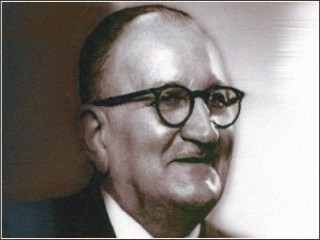
Etienne Gilson biography
Date of birth : 1884-06-13
Date of death : 1978-09-19
Birthplace : Paris, France
Nationality : French
Category : Historian personalities
Last modified : 2011-04-16
Credited as : Catholic philosopher, historian of phylosophy,
The French Roman Catholic philosopher Étienne Henry Gilson was an important modern exponent of Thomism. He stressed the importance of rigorous philosophical reasoning corrected and expanded by Christian revelation.
On June 13, 1884, Étienne Gilson was born in Paris. He was educated at the Petit Seminaire de Notre-Dame-des-Champs and the Sorbonne (1895-1907). In 1908 Gilson married Therese Ravise they later had one son and two daughters. He spent several years as a high school teacher and pursued research at the Sorbonne, receiving a doctoral degree in 1913 for a dissertation on the philosophy of Rene Descartes. The same year Gilson began teaching at the University of Lille. During this period he moved from a thorough training in modern philosophy to the study of medieval philosophy on the advice of his teacher at the Sorbonne, the distinguished philosopher Lucien Levy-Bruhl.
Gilson served in the French army in World War I. He was captured at the Battle of Verdun in 1915 and spent the remainder of the war as a prisoner.
From 1919 to 1921 Gilson taught at the University of Strasbourg. In 1921 he became professor of the history of philosophy at the Sorbonne, and during the next ten years he achieved an international reputation as a philosopher and medieval scholar. In 1932 he was made first holder of the chair of the history of medieval philosophy at the College de France.
Distinguished visiting lectureships and honors marked Gilson's career. His Gifford Lectures at the University of Aberdeen (1930-1931) became perhaps his best-known book, The Spirit of Medieval Philosophy (1932). His William James Lectures at Harvard in 1935 were published as The Unity of Philosophical Experience (1937). In 1947 he was honored by the highest distinction attainable by the French scholar: membership in the French Academy.
While a visiting professor at Harvard in 1927, Gilson was invited to Toronto to establish an institute of medieval studies. The institute was established in 1929 in connection with St. Michael's College of the University of Toronto and, under Gilson's direction, became perhaps the finest center in the Western world for research on the Middle Ages. After years of "commuting" between France and Canada, Gilson resigned from his chair at the College de France in 1951 and devoted the remainder of his active career to directing the institute in Toronto.
Among Gilson's prolific writings were The Christian Philosophy of Saint Thomas Aquinas (1919), The Philosophy of Saint Bonaventure (1924), The Mystical Theology of Saint Bernard (1934), Christianity and Philosophy (1936), God and Philosophy (1941), and Being and Some Philosophers (1949).
Anton Pegis summed up the relevance of Gilson's resolute preoccupation with the philosophy of the 13th-century St. Thomas Aquinas in these words: "In this new age, full of historical pressures and conflicts, of new and unexplored philosophical horizons, Thomism is for Gilson a philosophy equipped to deal with man in all the concreteness of his life and in all the existential dimensions of his thought." Gilson died on September 19, 1978, in Cravant, France.
















